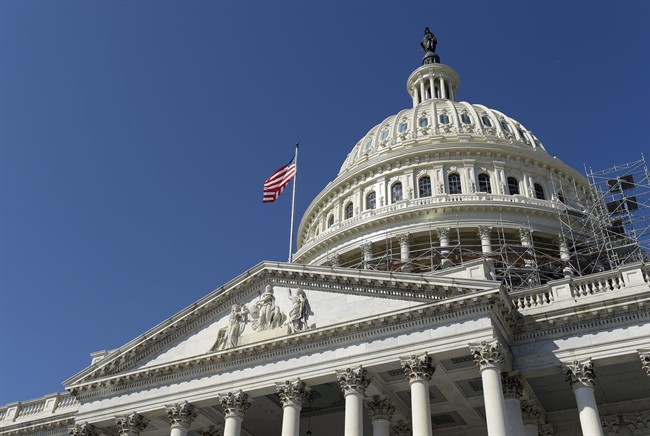Whether it’s Donald Trump or Hillary Clinton pulling a moving truck up to 1600 Pennsylvania Ave. this November, the next president of the United States will likely have to contend with some cranky Washington neighbours.

Namely, the United States Congress, housed in the Capitol Building just a few kilometres away.
Made up of the House of Representatives and the Senate, Congress has the power to make or break a president’s time in office. The two houses retain a great deal of decision-making power, and have the final say on major new forms of public spending and public benefits, among other things.
“At the end of the day, if you don’t have the legislative branch on-side, you’re done. You’re cooked,” said Donald Abelson, professor and chair in the department of Political Science at the University of Western Ontario.
“It’s very very important for a president, regardless of their party, to be able to get along with both parties in the U.S. Congress.”
WATCH: Trump wants U.S. out of TPP deal and threatens to take country out of NAFTA

To a certain extent, a president’s success depends on which party dominates Congress after the election. A third of the Senate seats are being voted on across America at the same time as the presidential ballots are cast on Nov. 8, and the entirety of the House of Representatives will also be put to the American electorate.
Most experts agree that the House of Representatives will stay majority Republican, but the Senate could swing to the Democrats. That would make Trump’s life very difficult, said Abelson, as he wouldn’t necessarily have the votes needed to move his plans (like building a wall between the U.S. and Mexico) forward.
‘Little barons’
To complicate matters, none of the members of Congress are forced to vote for or against legislation based on their political affiliation.
“Members of Congress, whether it’s in the House or in the Senate, will vote not only according to their wishes but according to the wishes of the people who put them in office,” Abelson explained. “They’re responsible to their constituents.”
READ MORE: Donald Trump threatens to sue New York Times over sexual assault allegation article
Ryan Hurl, assistant professor of political science at the University of Toronto, agreed that ideology has often been more important than party affiliation in Congress.
“The metaphor I give to my students is that, in some ways, Congress can be like a medieval kingdom, where every member of (the House of Representatives) or Senator is like their own little baron,” he said.
Practically speaking, that means that even if there are a majority of Republicans in both houses, Trump’s desired laws won’t just sail through. He’ll still have to do plenty of arm-twisting, said Abelson, and the same is true for Clinton.
“She’s going to face a lot of pressure early on,” he predicted.
“My sense is that if you have a Republican-controlled Congress after the election and Hillary Clinton wins, they will do everything in their power to sabotage her presidency. And she could end up being a one-term president.”
WATCH: Clinton and Trump supporters compete on in mock Family Feud on SNL
Hurl was slightly more optimistic about Clinton’s chances, saying she may be willing to meet House Republicans half-way on some issues. And the Republicans may be easier to sway if they’re “hanging on by their fingernails” to a congressional majority.
“Trump simply does not have the experience to be an effective president, and I can’t imagine he’s going to have the skill to negotiate with Congress, whether he’s facing a Republican congress or a Democratic Congress,” Hurl noted.
“With Clinton, I think it is more likely … her political background and her political experience will lead her to see the virtues of compromise.”
Executive orders
In spite of these obstacles, the president does wield significant power. He or she may not have the ability to declare war, for example, but a president can decide to deploy troops.
Trump could also make good on his promise to pull out of NAFTA or other major trade deals. He doesn’t need congressional support for that, but he would need Congress on-side to renegotiate the agreements, or to form new ones.
And then there are executive orders. These can take varying forms, Abelson explained, but essentially they are directives issued by the president that have the full force of the law.
READ MORE: Is Donald Trump’s attack on Hillary Clinton’s stamina sexist?
- What is a halal mortgage? How interest-free home financing works in Canada
- Capital gains changes are ‘really fair,’ Freeland says, as doctors cry foul
- Ontario doctors offer solutions to help address shortage of family physicians
- Budget 2024 failed to spark ‘political reboot’ for Liberals, polling suggests
As long as they are legal and don’t run contrary to the Constitution, executive orders can bypass the elected houses. The House of Representatives and Senate can’t vote against them, and getting laws in place to change them is extremely difficult.
The Supreme Court can only overturn them if they prove unconstitutional.
But according to Abelson, use of executive orders is usually more trouble than it’s worth, as it pits the Oval Office directly against the legislative branch. A strained relationship can quickly become downright dysfunctional, with Congress blocking the president every chance it gets.
Hurl said that given the type of rhetoric Trump has engaged in during the campaign — promising to unilaterally pull out of trade deals, for instance — Americans may also be particularly sensitive to any attempts by the next president to get around their elected representatives using executive orders.
“It’s possible that the public as a whole, and not just members of Congress, are going to be averse to independent presidential action that smacks of authoritarianism or even unconstitutional government.”




Comments